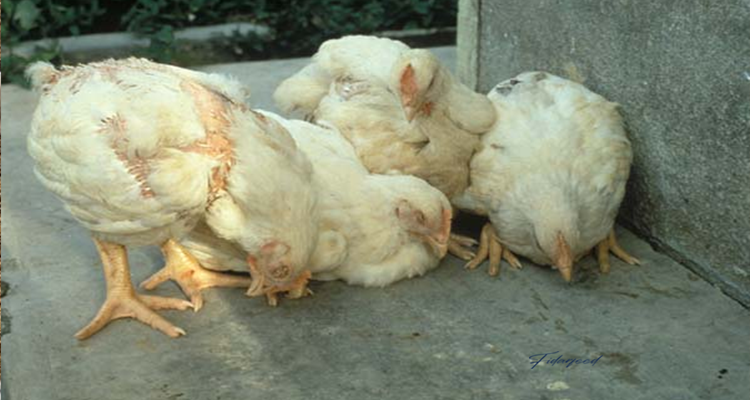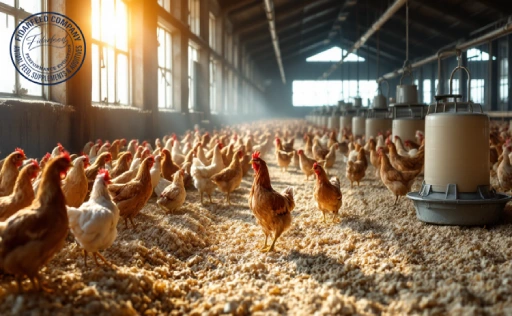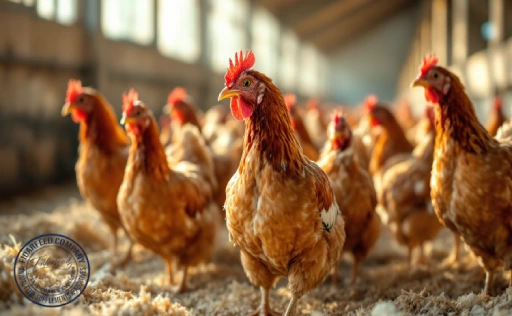Effective ways to prevent Newcastle disease in breeder hens are crucial for ensuring the health and productivity of your flock. As a breeder, the last thing you want is to face an outbreak that can significantly affect your operation. Newcastle disease (ND) is one of the most dangerous viral diseases affecting poultry worldwide, and its impact on breeder hens can be devastating. This article will walk you through practical, science-backed methods to prevent Newcastle disease, safeguard your flock, and maintain a healthy, productive breeding operation.
What Is Newcastle Disease and Why Should Breeder Hen Farmers Be Concerned?
Newcastle disease (ND) is a highly contagious viral infection caused by the Newcastle disease virus (NDV), which affects poultry and other bird species. The disease is named after Newcastle, a port city in England, where it was first identified in the 1920s. It can cause severe respiratory, digestive, and neurological issues in chickens, and it is known for high mortality rates, particularly in unvaccinated flocks.
Learn more about: Probiotic Supplement for Poultry
For breeder hens, Newcastle disease poses a unique challenge. The virus can spread rapidly among the flock, leading to significant losses in egg production, fertility, and overall hen health. Infected hens can experience paralysis, difficulty breathing, and in some cases, sudden death. Even hens that survive may suffer long-term damage, including decreased laying rates or poor-quality eggs.
Preventing Newcastle disease is vital for maintaining long-term flock health, as an outbreak can lead to severe financial losses, compromised genetics, and even potential shutdowns of operations.
Recognizing the Early Symptoms of Newcastle Disease in Breeder Hens
Recognizing the early signs of Newcastle disease is key to effective management and prevention. Symptoms can vary depending on the severity of the infection, but here are the most common early indicators:
-
Respiratory distress: Infected birds may show signs of labored breathing, coughing, or sneezing.
-
Digestive problems: Diarrhea and a decrease in feed intake are common.
-
Neurological symptoms: The virus can cause tremors, twisted necks (also known as torticollis), and paralysis, especially in the legs or wings.
-
Drop in egg production: Hens may stop laying or produce fewer eggs.
-
Swollen head or neck: This is a more severe symptom, typically seen in advanced stages of the disease.
Learn more about: How to Treat Arthritis in Chickens: Key Strategies for Healthier Breeder Birds
If you notice any of these symptoms, it’s critical to take immediate action. Early intervention can help limit the spread of the disease and reduce the overall impact on your flock.
Vaccination: Your First Line of Defense Against Newcastle Disease in Breeder Hens
Vaccination is the most effective way to prevent Newcastle disease. There are several types of vaccines available, and the choice depends on factors like the age of your hens and the level of virus exposure in your area. Vaccination not only prevents disease but also reduces the severity of infection if exposed.
Key points about vaccination:
-
Timing is crucial: Vaccinate your breeder hens at hatch or as early as possible to ensure they are protected from the moment they are exposed to the virus.
-
Types of vaccines: Live attenuated vaccines and inactivated vaccines are the two main types. Live vaccines are generally more effective but may not be suitable for all situations, especially if hens are immunocompromised. Inactivated vaccines are safer for pregnant or weakened birds.
-
Boosters: Annual boosters are recommended to maintain immunity, as protection can wane over time.
Learn more about: Mastering the Basics: A Comprehensive Broiler Breeder Management Guide
A well-timed vaccination program ensures that your breeder hens have the immunity they need to resist infection and reduce the risk of a full-blown outbreak.
How Biosecurity Practices Help Prevent Newcastle Disease in Breeder Hens
Biosecurity is a set of management practices designed to prevent the introduction and spread of disease within a flock. For Newcastle disease, biosecurity is essential to protect your breeder hens from exposure.
Some key biosecurity measures include:
-
Restricting access: Limit the entry of people, vehicles, and equipment to your farm to prevent virus introduction.
-
Disinfection: Use disinfectants on shoes, tools, and other items that enter the poultry house. Footbaths and hand sanitizers can greatly reduce the risk of spreading the virus.
Learn more about: Boosting Broiler Breeder Egg Production: A Comprehensive Lighting Guide
-
Controlling airflow: NDV is airborne, so controlling ventilation and preventing cross-contamination between different barns or sections of the farm is vital.
-
Quarantining new birds: Any new birds should be isolated for at least 2-3 weeks to ensure they are free from disease.
Implementing strong biosecurity practices helps minimize the chance of the virus entering your flock and is your first line of defense against Newcastle disease.
The Role of Proper Nutrition in Strengthening Immunity Against Newcastle Disease
A well-balanced diet plays a significant role in building and maintaining a strong immune system in your breeder hens. Hens with strong immunity are better able to fight off infections, including Newcastle disease.
Key nutritional strategies include:
-
Provide high-quality protein: Protein is essential for egg production and immune function.
-
Essential vitamins and minerals: Vitamins A, D, E, and selenium are crucial for immune health and disease resistance.
Learn more about: The Ultimate Poultry Breeder Management Guide: Boost Your Flock’s Productivity
-
Omega-3 fatty acids: These help improve overall health and immune response, making hens more resilient to infections.
-
Probiotics and prebiotics: These support gut health and help maintain a balanced microbiome, essential for immune function.
Incorporating these nutrients into your hens’ diet ensures they have the strength to fend off the Newcastle virus and remain healthy, even in challenging environments.
Managing Stress to Prevent Disease: Keeping Breeder Hens Healthy
Stress is one of the leading contributors to disease outbreaks in poultry. When hens are stressed, their immune systems weaken, making them more susceptible to infections, including Newcastle disease. Common stressors include overcrowding, sudden changes in temperature, poor ventilation, and improper handling.
Tips for managing stress in breeder hens:
-
Maintain optimal space: Ensure that your birds have enough room to move around comfortably.
-
Provide consistent temperatures: Avoid sudden temperature fluctuations and ensure proper heating and cooling systems.
-
Gentle handling: Minimize handling, and if necessary, handle birds gently and calmly to avoid inducing stress.
Learn more about: What is the Best Way to Manage Poultry Litter on My Farm? A Comprehensive Guide
By reducing stress, you can boost the overall health and well-being of your hens, thereby lowering their risk of disease.
Sanitation and Hygiene: How to Keep Your Poultry House Free of Disease-Causing Agents
A clean environment is crucial for preventing the spread of Newcastle disease. Regular cleaning and disinfecting can help eliminate disease-causing agents, including viruses like NDV.
Essential sanitation practices:
-
Regular cleaning of floors, walls, and equipment: Remove bedding, clean surfaces, and disinfect thoroughly.
-
Proper waste management: Dispose of manure and waste materials properly to avoid contamination.
-
Water quality: Ensure clean, fresh water is available to your hens at all times.
Learn more about: Probiotics for Poultry Farming: Boost Gut Health & Performance
By maintaining high standards of hygiene, you can drastically reduce the risk of disease transmission.
Monitoring and Surveillance: The Key to Early Detection and Prevention of Newcastle Disease
Regular health monitoring is essential for catching Newcastle disease early, which can make a significant difference in controlling the spread. Implement a surveillance program that includes:
-
Routine checks for symptoms: Look for signs of respiratory distress, digestive issues, or neurological symptoms.
-
Temperature monitoring: Keep track of flock temperature to identify any sudden changes that might indicate illness.
Early detection allows for swift action, limiting the spread and impact of the disease.
Quarantine Procedures: How Isolating New Birds Can Protect Your Existing Flock
Introducing new birds to your farm can be risky, as they might carry Newcastle disease or other infections. Quarantining new birds for at least two weeks helps ensure they are free from disease before mixing with the rest of the flock.
Steps to quarantine new birds:
-
Separate housing: Keep new birds in a separate barn or area.
-
Health monitoring: Check for symptoms of illness daily.
-
Strict biosecurity: Ensure that those handling the new birds follow proper hygiene protocols to avoid cross-contamination.
Learn more about: Top Causes of Salmonella in Poultry: A Comprehensive Guide
By quarantining new birds, you safeguard your existing flock and significantly reduce the risk of an outbreak.
Creating an Effective Newcastle Disease Prevention Plan for Your Breeder Hen Farm
To ensure the long-term health and productivity of your breeder hens, it’s essential to have a comprehensive Newcastle disease prevention plan in place. This plan should include:
-
Vaccination schedule: Regular and timely vaccination of all hens.
-
Strict biosecurity protocols: Implementing access control, disinfection, and isolation measures.
-
Regular monitoring: Conducting health checks and surveillance to detect any potential outbreaks early.
By following these steps, you can significantly reduce the risk of Newcastle disease and protect your investment in your breeder hens.
Conclusion
Newcastle disease is a serious threat to breeder hens, but with the right preventive measures, you can protect your flock and ensure their productivity. Vaccination, biosecurity, good nutrition, and effective management practices are all key to keeping your hens healthy and free from disease. By staying vigilant and proactive, you can ensure a healthy, productive breeding operation.
Have questions or insights? Feel free to leave a comment, share your thoughts, or ask any questions you might have. Let’s keep the conversation going and help each other maintain healthy poultry farms!










